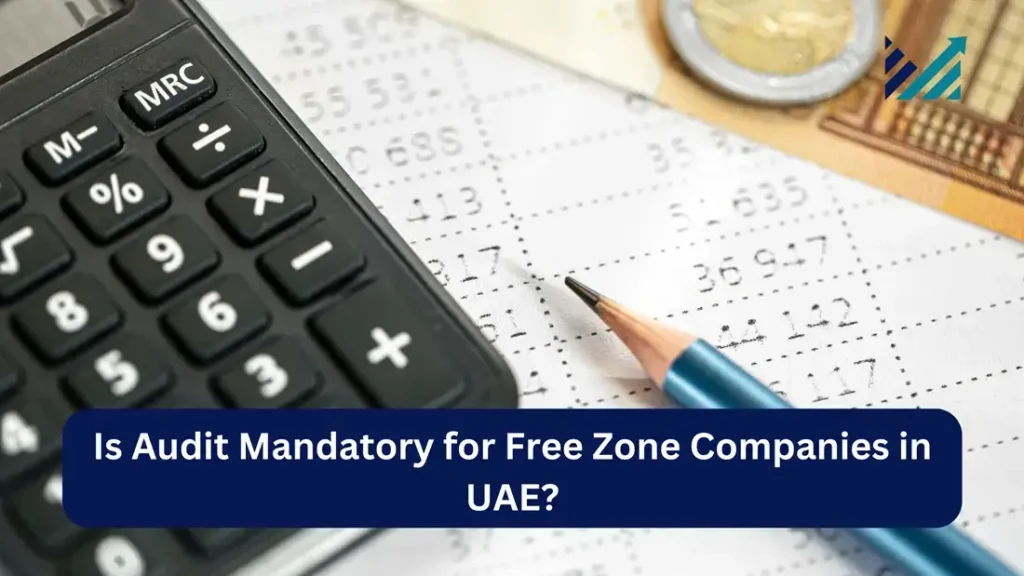
Is Audit Mandatory for Free Zone Companies in UAE? While not universally mandatory across all UAE free zones, an audit is generally required for most Free Zone Companies (FZCO) in UAE. Each free zone authority has its own specific audit requirements, and many mandate audited financial statements for trade license renewal and compliance. Additionally, exceeding certain turnover thresholds or employee counts may trigger a mandatory audit within a specific free zone.
Auditing in Free Zones in UAE
Free zones in UAE offer various business benefits, such as tax exemptions and full foreign ownership. However, compliance with financial reporting and auditing regulations is crucial to maintaining these advantages.
An audit in a UAE free zone is a review and examination of a company’s financial records and statements to ensure they comply with the accounting standards and regulations set by the respective free zone authority. This audit is typically conducted by an approved auditor or audit firm recognized by the free zone authority, providing assurance to stakeholders that the financial statements are accurate and reliable.
Companies registered in free zones and holding a free zone trade license are required to submit an audited annual financial statement as part of the trade license renewal process. Each company can choose its own financial year based on its business requirements, but the chosen financial year must begin from the date of incorporation and should not be shorter than six months or longer than 18 months.
Audit Requirements in Free Zones in UAE
There are several audit requirements for companies operating in UAE free zones. Below are the key audit requirements:
Companies in UAE free zones are generally required to submit audit reports. However, some entities, like Free Zone Companies (FZCO) and Free Zone Establishments (FZE), must undergo mandatory audits.
Auditing is essential for most Free Zone Companies, especially those registered with DMCC, Meydan Free Zone, DWC, and JAFZA.
As per the law, Free Zone Companies must hire an auditor approved by the Free Zone Authority. Only auditing firms with a valid professional license under the Ministry of Economy can provide auditing services.
The eligibility of the auditing firm is crucial. Hiring an ineligible auditing company can result in legal consequences. Therefore, choosing a recognized firm audit in UAE ensures compliance with free zone regulations.
Companies registered in free zones must submit audited financial statements to the relevant Free Zone Authority. Some authorities require these statements for trade license renewal. Failing to submit them can result in penalties or rejection of the trade license renewal.
To avoid penalties, companies should maintain proper financial records and ensure timely audits.
Is Audit Mandatory for Free Zone Companies in UAE?
While not universally mandatory across all UAE free zones, an audit is generally considered mandatory for most Free Zone Companies (FZCO) in the UAE, as each free zone authority may have its own specific requirements, and many require audited financial statements for trade license renewal and compliance purposes; exceeding certain turnover thresholds or employee counts could also trigger a mandatory audit within a specific free zone.
Key Points to Remember
- Specific to Each Free Zone: Different free zones in the UAE may have varying audit requirements. Always verify the regulations of your respective free zone.
- Trade License Renewal: Most free zones require audited financial statements for renewing a company’s trade license. Ensure timely submission to avoid delays.
- Penalties for Non-Compliance: Failure to comply with audit requirements can result in fines and penalties imposed by the free zone authority.
- Consult Your Free Zone Authority: Always check with your specific free zone authority to understand the exact audit regulations applicable to your business.
Mandatory Audit Requirement for a Free Zone Company Under Corporate Tax Law
Under the UAE Corporate Tax Law, free zone companies must maintain proper financial records and submit audited financial statements annually. This requirement is especially crucial for Qualifying Free Zone Companies (QFZCs) to retain their 0% corporate tax rate.
When Should You Submit the Audited Financial Statement?
Free Zone Companies (FZCO) are required to prepare and submit audited financial statements in compliance with the regulations of their respective free zone authorities. Timely submission is crucial to avoid penalties or non-compliance issues. Below is an overview of the submission deadlines set by major free zones in the UAE:
| Free Zone Authority | Submission Deadline for Audited Financial Statements |
|---|---|
| Jebel Ali Free Zone Authority (JAFZA) | Within 90 days after the end of the financial year |
| Dubai South Free Zone (DWC) | Within 90 days after the end of the financial year |
| Sharjah International Airport Free Zone (SAIF) | Within 90 days after the end of the financial year |
| Dubai Silicon Oasis (DSO) | Within 4 months after the end of the financial year |
| Ras Al Khaimah Economic Zone (RAKEZ) | Within 6 months after the end of the financial year |
| Dubai Development Authority (DDA) | Within 6 months after the end of the financial year |
| Dubai Multi Commodities Centre (DMCC) | Within 180 days after the end of the financial year |
Note: The submission deadlines listed above are general guidelines and may vary depending on your company’s license type or specific instructions issued by the free zone authority. Always refer to the official communication from your respective authority to ensure compliance.
Audit Submission Penalty in UAE Free Zones
Failure to comply with audit requirements may result in:
- Monetary fines
- Restrictions on business operations
- Suspension or non-renewal of trade licenses
Approved Auditors in Free Zones
Free zone companies must appoint auditors approved by their respective free zone authorities. Below is a list of approved auditors in various free zones:
Approved Auditors in DMCC (Dubai Multi Commodities Centre)
- DMCC mandates annual audits for all registered companies.
- Auditors must be approved by the DMCC Authority.
Approved Auditors in DAFZA (Dubai Airport Free Zone Authority)
- Auditors must be registered with DAFZA’s approved list.
- Companies must submit audited statements annually.
Approved Auditors in SAIF Zone (Sharjah Airport International Free Zone)
- SAIF Zone companies must conduct annual audits.
- Only approved auditors recognized by SAIF Zone can perform audits.
Approved Auditors in IFZA (International Free Zone Authority)
- IFZA companies must submit annual audited financial statements.
- Only IFZA-approved auditors can conduct audits.
Approved Auditors in Shams Zone (Sharjah Media City)
- Mandatory audit requirements for most companies.
- Audits must be conducted by approved auditors.
Approved Auditors in DWC (Dubai South)
- Dubai South requires companies to submit audited reports annually.
- Only listed auditors are permitted to perform audits.
Approved Auditors in Dubai World Trade Centre (DWTC)
- Annual audits are required.
- Only DWTC-approved auditors can be appointed.
Approved Auditors in UAE Free Trade Zone
- Each free trade zone has a list of authorized auditors.
- Companies must comply with individual free zone regulations.
Approved Auditors in RAKEZ (Ras Al Khaimah Economic Zone)
- Annual audit submission required for companies in RAKEZ.
- Auditors must be on RAKEZ’s approved list.
Approved Auditors in JAFZA (Jebel Ali Free Zone Authority)
- All JAFZA-registered companies must conduct annual audits.
- Audit reports must be submitted by JAFZA-approved auditors.
Approved Auditors in DIFC (Dubai International Financial Centre)
- DIFC mandates strict financial reporting and annual audits.
- Only DIFC-licensed auditors can conduct audits.
Helpful for you : What Does an Audit Firm Do in UAE?
Conclusion
Auditing is a crucial requirement for most UAE free zone companies, ensuring compliance with corporate tax laws, trade license renewals, and financial transparency. Business owners should consult their respective free zone authorities to stay informed about specific audit regulations and engage approved auditors to avoid penalties and legal complications.
FAQs
Is Audit Mandatory for All Companies in UAE?
No, not all companies in the UAE require an audit. The requirement depends on the company type and location:
- Mainland Companies: Audit requirements depend on the legal structure. For example, Limited Liability Companies (LLCs) may not need an audit unless specified in the Memorandum of Association (MoA).
- Free Zone Companies: Some free zones require audits, while others do not.
- Offshore Companies: In many cases, offshore companies are not required to undergo an audit unless mandated by the jurisdiction.
What Are the Free Zone Rules in the UAE?
Each free zone in the UAE operates under its own regulatory framework, but common rules include:
- 100% Foreign Ownership: No need for a local sponsor.
- Tax Benefits: Corporate tax exemptions (subject to new corporate tax laws).
- Customs Benefits: Duty-free imports and exports within the free zone.
- Regulated Business Activities: Activities must comply with the free zone authority’s regulations.
- Office Requirements: Some free zones require physical office space, while others allow virtual offices.
- Annual Renewals: Companies must renew their licenses yearly and comply with financial reporting obligations.
Which Companies Do Not Require an Audit?
- Some Free Zone Companies: If the free zone does not mandate it.
- Offshore Companies: In JAFZA, RAK ICC, and Ajman offshore, an audit may not be required.
- Small Private Companies: If not required by the MoA or stakeholders.
- Sole Establishments & Civil Companies: In many cases, these do not require an audit unless mandated by authorities or banks.
Related: Guide to Qualifying Free Zone Persons (QFZPs) in UAE

